Faith Diversity in Healthcare: Christian and Buddhist Perspectives
VerifiedAdded on 2020/03/16
|7
|2367
|42
Essay
AI Summary
This essay delves into the crucial role of healthcare providers in understanding and respecting faith diversity, specifically focusing on Christian and Buddhist perspectives. It emphasizes the need for healthcare professionals to be aware of patients' physical, religious, cultural, and spiritual needs to provide holistic care. The essay explores the commonalities and differences between Christian and Buddhist beliefs regarding medical interventions, spiritual practices, and end-of-life care. It highlights how understanding these diverse viewpoints can help healthcare providers establish common protocols for patient care across different religions and cultures. The discussion covers topics such as prayer, meditation, dietary restrictions, and attitudes toward medical procedures like abortion, blood donation, and organ donation. The essay concludes by stressing the importance of treating patients with dignity, empathy, and respect for their individual beliefs to facilitate a more effective and compassionate healing process.
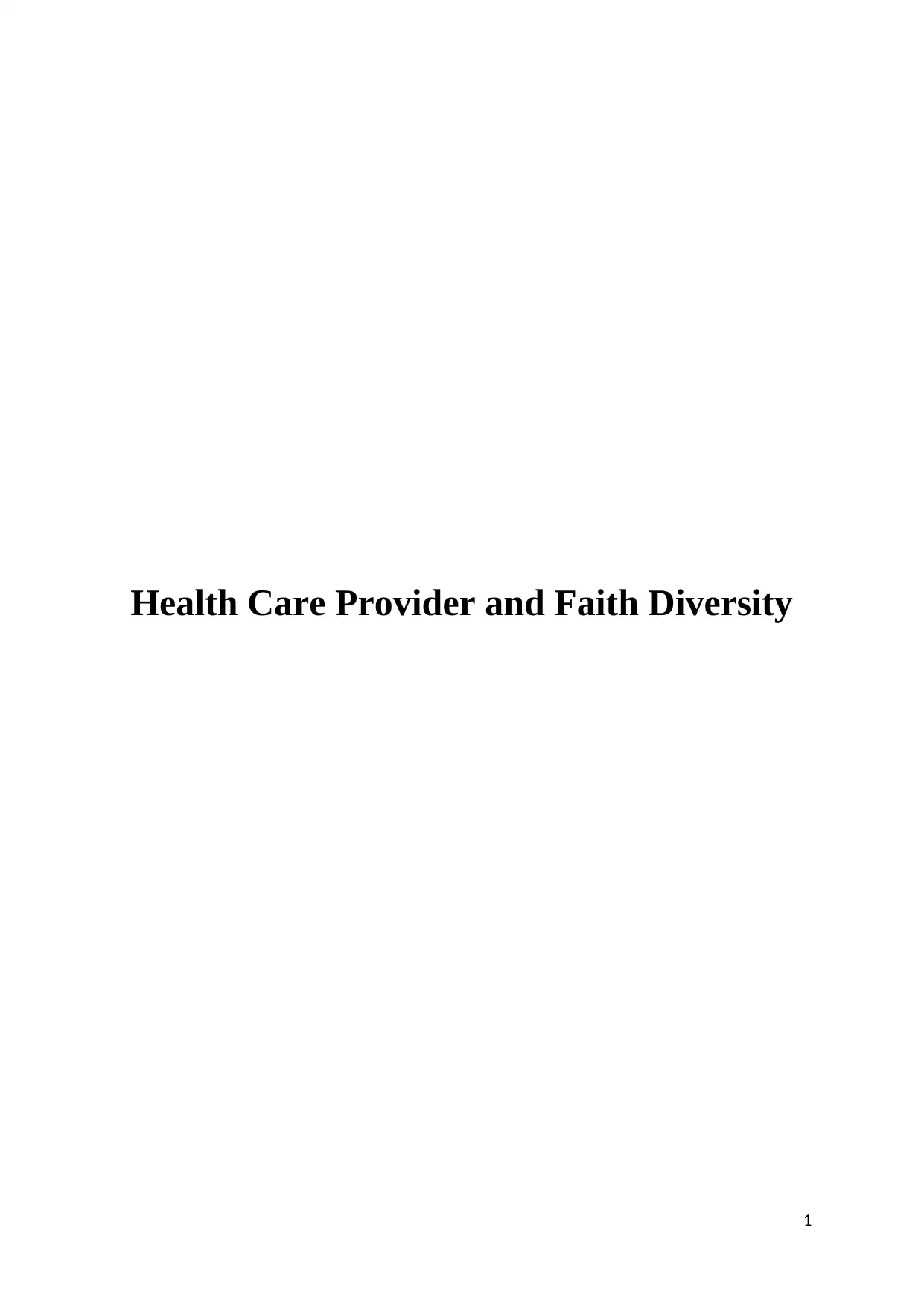
Health Care Provider and Faith Diversity
1
1
Paraphrase This Document
Need a fresh take? Get an instant paraphrase of this document with our AI Paraphraser
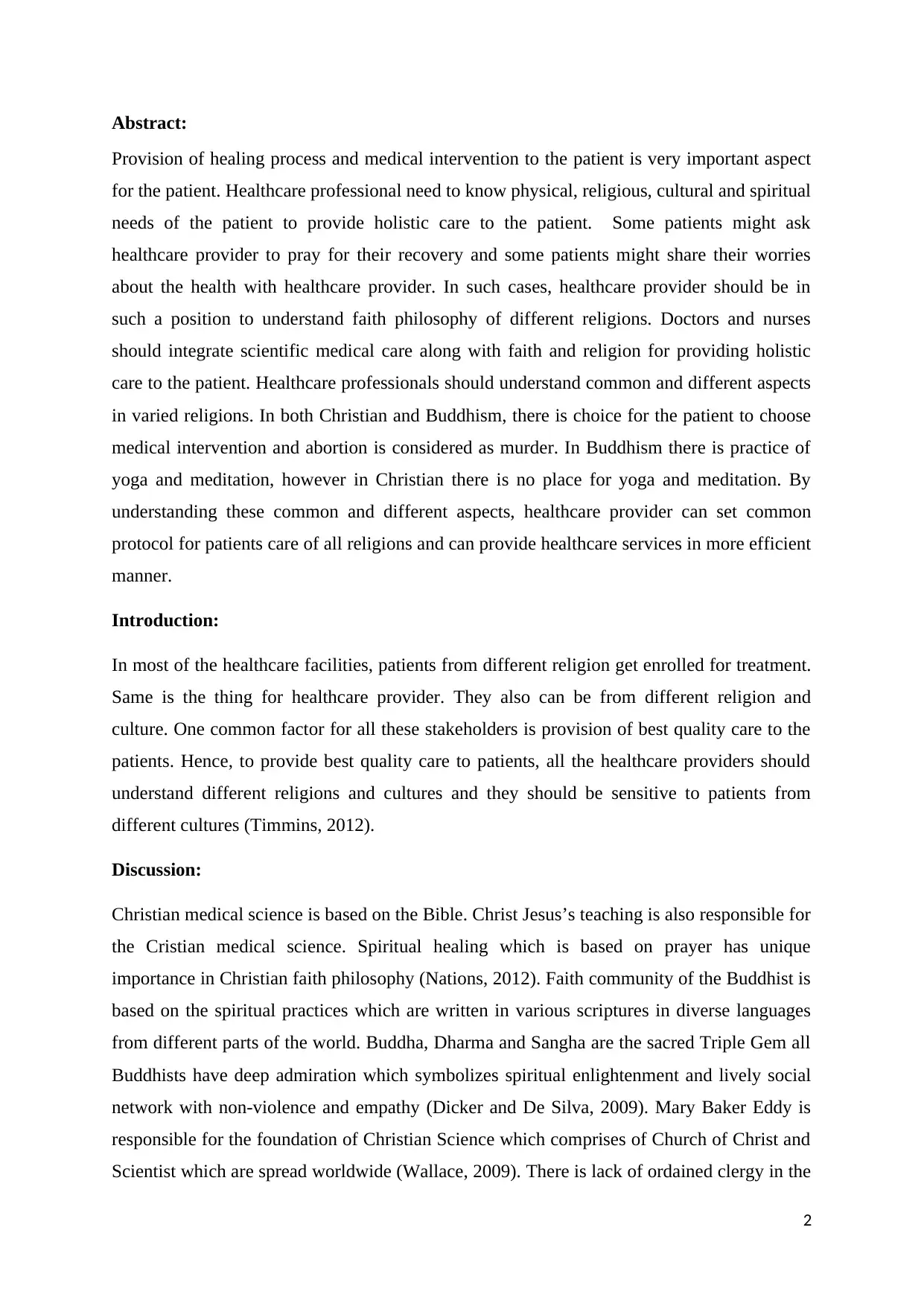
Abstract:
Provision of healing process and medical intervention to the patient is very important aspect
for the patient. Healthcare professional need to know physical, religious, cultural and spiritual
needs of the patient to provide holistic care to the patient. Some patients might ask
healthcare provider to pray for their recovery and some patients might share their worries
about the health with healthcare provider. In such cases, healthcare provider should be in
such a position to understand faith philosophy of different religions. Doctors and nurses
should integrate scientific medical care along with faith and religion for providing holistic
care to the patient. Healthcare professionals should understand common and different aspects
in varied religions. In both Christian and Buddhism, there is choice for the patient to choose
medical intervention and abortion is considered as murder. In Buddhism there is practice of
yoga and meditation, however in Christian there is no place for yoga and meditation. By
understanding these common and different aspects, healthcare provider can set common
protocol for patients care of all religions and can provide healthcare services in more efficient
manner.
Introduction:
In most of the healthcare facilities, patients from different religion get enrolled for treatment.
Same is the thing for healthcare provider. They also can be from different religion and
culture. One common factor for all these stakeholders is provision of best quality care to the
patients. Hence, to provide best quality care to patients, all the healthcare providers should
understand different religions and cultures and they should be sensitive to patients from
different cultures (Timmins, 2012).
Discussion:
Christian medical science is based on the Bible. Christ Jesus’s teaching is also responsible for
the Cristian medical science. Spiritual healing which is based on prayer has unique
importance in Christian faith philosophy (Nations, 2012). Faith community of the Buddhist is
based on the spiritual practices which are written in various scriptures in diverse languages
from different parts of the world. Buddha, Dharma and Sangha are the sacred Triple Gem all
Buddhists have deep admiration which symbolizes spiritual enlightenment and lively social
network with non-violence and empathy (Dicker and De Silva, 2009). Mary Baker Eddy is
responsible for the foundation of Christian Science which comprises of Church of Christ and
Scientist which are spread worldwide (Wallace, 2009). There is lack of ordained clergy in the
2
Provision of healing process and medical intervention to the patient is very important aspect
for the patient. Healthcare professional need to know physical, religious, cultural and spiritual
needs of the patient to provide holistic care to the patient. Some patients might ask
healthcare provider to pray for their recovery and some patients might share their worries
about the health with healthcare provider. In such cases, healthcare provider should be in
such a position to understand faith philosophy of different religions. Doctors and nurses
should integrate scientific medical care along with faith and religion for providing holistic
care to the patient. Healthcare professionals should understand common and different aspects
in varied religions. In both Christian and Buddhism, there is choice for the patient to choose
medical intervention and abortion is considered as murder. In Buddhism there is practice of
yoga and meditation, however in Christian there is no place for yoga and meditation. By
understanding these common and different aspects, healthcare provider can set common
protocol for patients care of all religions and can provide healthcare services in more efficient
manner.
Introduction:
In most of the healthcare facilities, patients from different religion get enrolled for treatment.
Same is the thing for healthcare provider. They also can be from different religion and
culture. One common factor for all these stakeholders is provision of best quality care to the
patients. Hence, to provide best quality care to patients, all the healthcare providers should
understand different religions and cultures and they should be sensitive to patients from
different cultures (Timmins, 2012).
Discussion:
Christian medical science is based on the Bible. Christ Jesus’s teaching is also responsible for
the Cristian medical science. Spiritual healing which is based on prayer has unique
importance in Christian faith philosophy (Nations, 2012). Faith community of the Buddhist is
based on the spiritual practices which are written in various scriptures in diverse languages
from different parts of the world. Buddha, Dharma and Sangha are the sacred Triple Gem all
Buddhists have deep admiration which symbolizes spiritual enlightenment and lively social
network with non-violence and empathy (Dicker and De Silva, 2009). Mary Baker Eddy is
responsible for the foundation of Christian Science which comprises of Church of Christ and
Scientist which are spread worldwide (Wallace, 2009). There is lack of ordained clergy in the
2
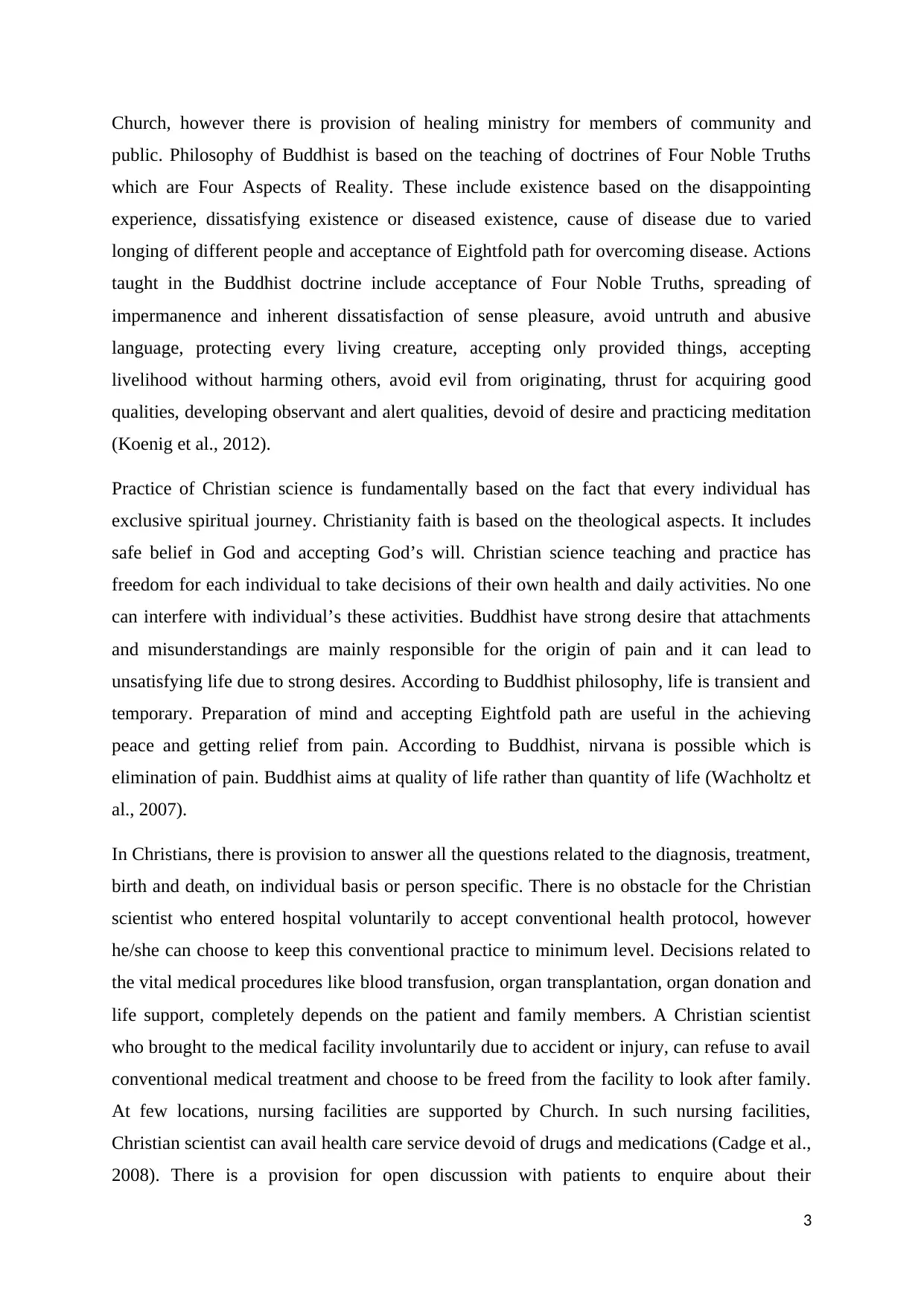
Church, however there is provision of healing ministry for members of community and
public. Philosophy of Buddhist is based on the teaching of doctrines of Four Noble Truths
which are Four Aspects of Reality. These include existence based on the disappointing
experience, dissatisfying existence or diseased existence, cause of disease due to varied
longing of different people and acceptance of Eightfold path for overcoming disease. Actions
taught in the Buddhist doctrine include acceptance of Four Noble Truths, spreading of
impermanence and inherent dissatisfaction of sense pleasure, avoid untruth and abusive
language, protecting every living creature, accepting only provided things, accepting
livelihood without harming others, avoid evil from originating, thrust for acquiring good
qualities, developing observant and alert qualities, devoid of desire and practicing meditation
(Koenig et al., 2012).
Practice of Christian science is fundamentally based on the fact that every individual has
exclusive spiritual journey. Christianity faith is based on the theological aspects. It includes
safe belief in God and accepting God’s will. Christian science teaching and practice has
freedom for each individual to take decisions of their own health and daily activities. No one
can interfere with individual’s these activities. Buddhist have strong desire that attachments
and misunderstandings are mainly responsible for the origin of pain and it can lead to
unsatisfying life due to strong desires. According to Buddhist philosophy, life is transient and
temporary. Preparation of mind and accepting Eightfold path are useful in the achieving
peace and getting relief from pain. According to Buddhist, nirvana is possible which is
elimination of pain. Buddhist aims at quality of life rather than quantity of life (Wachholtz et
al., 2007).
In Christians, there is provision to answer all the questions related to the diagnosis, treatment,
birth and death, on individual basis or person specific. There is no obstacle for the Christian
scientist who entered hospital voluntarily to accept conventional health protocol, however
he/she can choose to keep this conventional practice to minimum level. Decisions related to
the vital medical procedures like blood transfusion, organ transplantation, organ donation and
life support, completely depends on the patient and family members. A Christian scientist
who brought to the medical facility involuntarily due to accident or injury, can refuse to avail
conventional medical treatment and choose to be freed from the facility to look after family.
At few locations, nursing facilities are supported by Church. In such nursing facilities,
Christian scientist can avail health care service devoid of drugs and medications (Cadge et al.,
2008). There is a provision for open discussion with patients to enquire about their
3
public. Philosophy of Buddhist is based on the teaching of doctrines of Four Noble Truths
which are Four Aspects of Reality. These include existence based on the disappointing
experience, dissatisfying existence or diseased existence, cause of disease due to varied
longing of different people and acceptance of Eightfold path for overcoming disease. Actions
taught in the Buddhist doctrine include acceptance of Four Noble Truths, spreading of
impermanence and inherent dissatisfaction of sense pleasure, avoid untruth and abusive
language, protecting every living creature, accepting only provided things, accepting
livelihood without harming others, avoid evil from originating, thrust for acquiring good
qualities, developing observant and alert qualities, devoid of desire and practicing meditation
(Koenig et al., 2012).
Practice of Christian science is fundamentally based on the fact that every individual has
exclusive spiritual journey. Christianity faith is based on the theological aspects. It includes
safe belief in God and accepting God’s will. Christian science teaching and practice has
freedom for each individual to take decisions of their own health and daily activities. No one
can interfere with individual’s these activities. Buddhist have strong desire that attachments
and misunderstandings are mainly responsible for the origin of pain and it can lead to
unsatisfying life due to strong desires. According to Buddhist philosophy, life is transient and
temporary. Preparation of mind and accepting Eightfold path are useful in the achieving
peace and getting relief from pain. According to Buddhist, nirvana is possible which is
elimination of pain. Buddhist aims at quality of life rather than quantity of life (Wachholtz et
al., 2007).
In Christians, there is provision to answer all the questions related to the diagnosis, treatment,
birth and death, on individual basis or person specific. There is no obstacle for the Christian
scientist who entered hospital voluntarily to accept conventional health protocol, however
he/she can choose to keep this conventional practice to minimum level. Decisions related to
the vital medical procedures like blood transfusion, organ transplantation, organ donation and
life support, completely depends on the patient and family members. A Christian scientist
who brought to the medical facility involuntarily due to accident or injury, can refuse to avail
conventional medical treatment and choose to be freed from the facility to look after family.
At few locations, nursing facilities are supported by Church. In such nursing facilities,
Christian scientist can avail health care service devoid of drugs and medications (Cadge et al.,
2008). There is a provision for open discussion with patients to enquire about their
3
⊘ This is a preview!⊘
Do you want full access?
Subscribe today to unlock all pages.

Trusted by 1+ million students worldwide
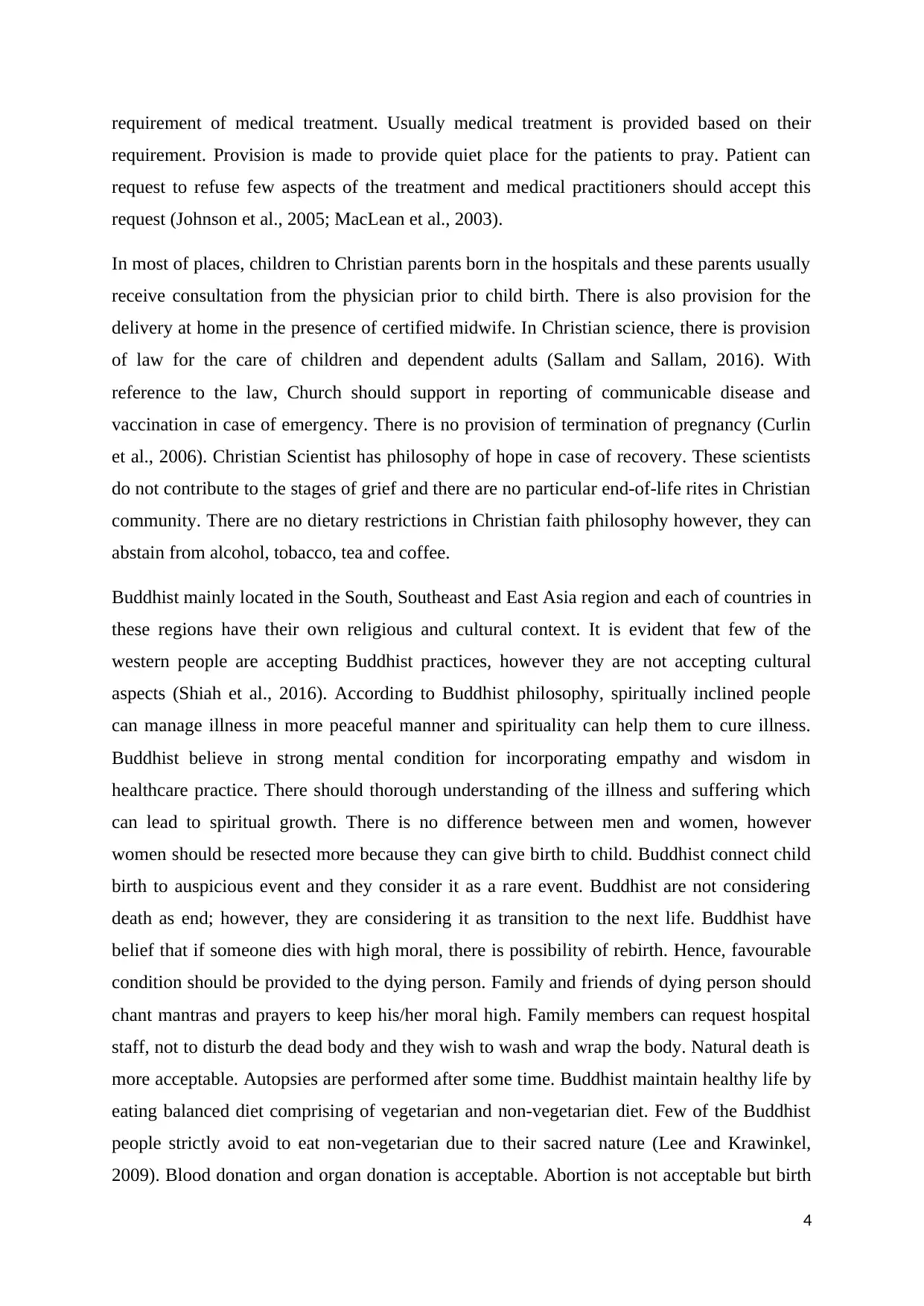
requirement of medical treatment. Usually medical treatment is provided based on their
requirement. Provision is made to provide quiet place for the patients to pray. Patient can
request to refuse few aspects of the treatment and medical practitioners should accept this
request (Johnson et al., 2005; MacLean et al., 2003).
In most of places, children to Christian parents born in the hospitals and these parents usually
receive consultation from the physician prior to child birth. There is also provision for the
delivery at home in the presence of certified midwife. In Christian science, there is provision
of law for the care of children and dependent adults (Sallam and Sallam, 2016). With
reference to the law, Church should support in reporting of communicable disease and
vaccination in case of emergency. There is no provision of termination of pregnancy (Curlin
et al., 2006). Christian Scientist has philosophy of hope in case of recovery. These scientists
do not contribute to the stages of grief and there are no particular end-of-life rites in Christian
community. There are no dietary restrictions in Christian faith philosophy however, they can
abstain from alcohol, tobacco, tea and coffee.
Buddhist mainly located in the South, Southeast and East Asia region and each of countries in
these regions have their own religious and cultural context. It is evident that few of the
western people are accepting Buddhist practices, however they are not accepting cultural
aspects (Shiah et al., 2016). According to Buddhist philosophy, spiritually inclined people
can manage illness in more peaceful manner and spirituality can help them to cure illness.
Buddhist believe in strong mental condition for incorporating empathy and wisdom in
healthcare practice. There should thorough understanding of the illness and suffering which
can lead to spiritual growth. There is no difference between men and women, however
women should be resected more because they can give birth to child. Buddhist connect child
birth to auspicious event and they consider it as a rare event. Buddhist are not considering
death as end; however, they are considering it as transition to the next life. Buddhist have
belief that if someone dies with high moral, there is possibility of rebirth. Hence, favourable
condition should be provided to the dying person. Family and friends of dying person should
chant mantras and prayers to keep his/her moral high. Family members can request hospital
staff, not to disturb the dead body and they wish to wash and wrap the body. Natural death is
more acceptable. Autopsies are performed after some time. Buddhist maintain healthy life by
eating balanced diet comprising of vegetarian and non-vegetarian diet. Few of the Buddhist
people strictly avoid to eat non-vegetarian due to their sacred nature (Lee and Krawinkel,
2009). Blood donation and organ donation is acceptable. Abortion is not acceptable but birth
4
requirement. Provision is made to provide quiet place for the patients to pray. Patient can
request to refuse few aspects of the treatment and medical practitioners should accept this
request (Johnson et al., 2005; MacLean et al., 2003).
In most of places, children to Christian parents born in the hospitals and these parents usually
receive consultation from the physician prior to child birth. There is also provision for the
delivery at home in the presence of certified midwife. In Christian science, there is provision
of law for the care of children and dependent adults (Sallam and Sallam, 2016). With
reference to the law, Church should support in reporting of communicable disease and
vaccination in case of emergency. There is no provision of termination of pregnancy (Curlin
et al., 2006). Christian Scientist has philosophy of hope in case of recovery. These scientists
do not contribute to the stages of grief and there are no particular end-of-life rites in Christian
community. There are no dietary restrictions in Christian faith philosophy however, they can
abstain from alcohol, tobacco, tea and coffee.
Buddhist mainly located in the South, Southeast and East Asia region and each of countries in
these regions have their own religious and cultural context. It is evident that few of the
western people are accepting Buddhist practices, however they are not accepting cultural
aspects (Shiah et al., 2016). According to Buddhist philosophy, spiritually inclined people
can manage illness in more peaceful manner and spirituality can help them to cure illness.
Buddhist believe in strong mental condition for incorporating empathy and wisdom in
healthcare practice. There should thorough understanding of the illness and suffering which
can lead to spiritual growth. There is no difference between men and women, however
women should be resected more because they can give birth to child. Buddhist connect child
birth to auspicious event and they consider it as a rare event. Buddhist are not considering
death as end; however, they are considering it as transition to the next life. Buddhist have
belief that if someone dies with high moral, there is possibility of rebirth. Hence, favourable
condition should be provided to the dying person. Family and friends of dying person should
chant mantras and prayers to keep his/her moral high. Family members can request hospital
staff, not to disturb the dead body and they wish to wash and wrap the body. Natural death is
more acceptable. Autopsies are performed after some time. Buddhist maintain healthy life by
eating balanced diet comprising of vegetarian and non-vegetarian diet. Few of the Buddhist
people strictly avoid to eat non-vegetarian due to their sacred nature (Lee and Krawinkel,
2009). Blood donation and organ donation is acceptable. Abortion is not acceptable but birth
4
Paraphrase This Document
Need a fresh take? Get an instant paraphrase of this document with our AI Paraphraser
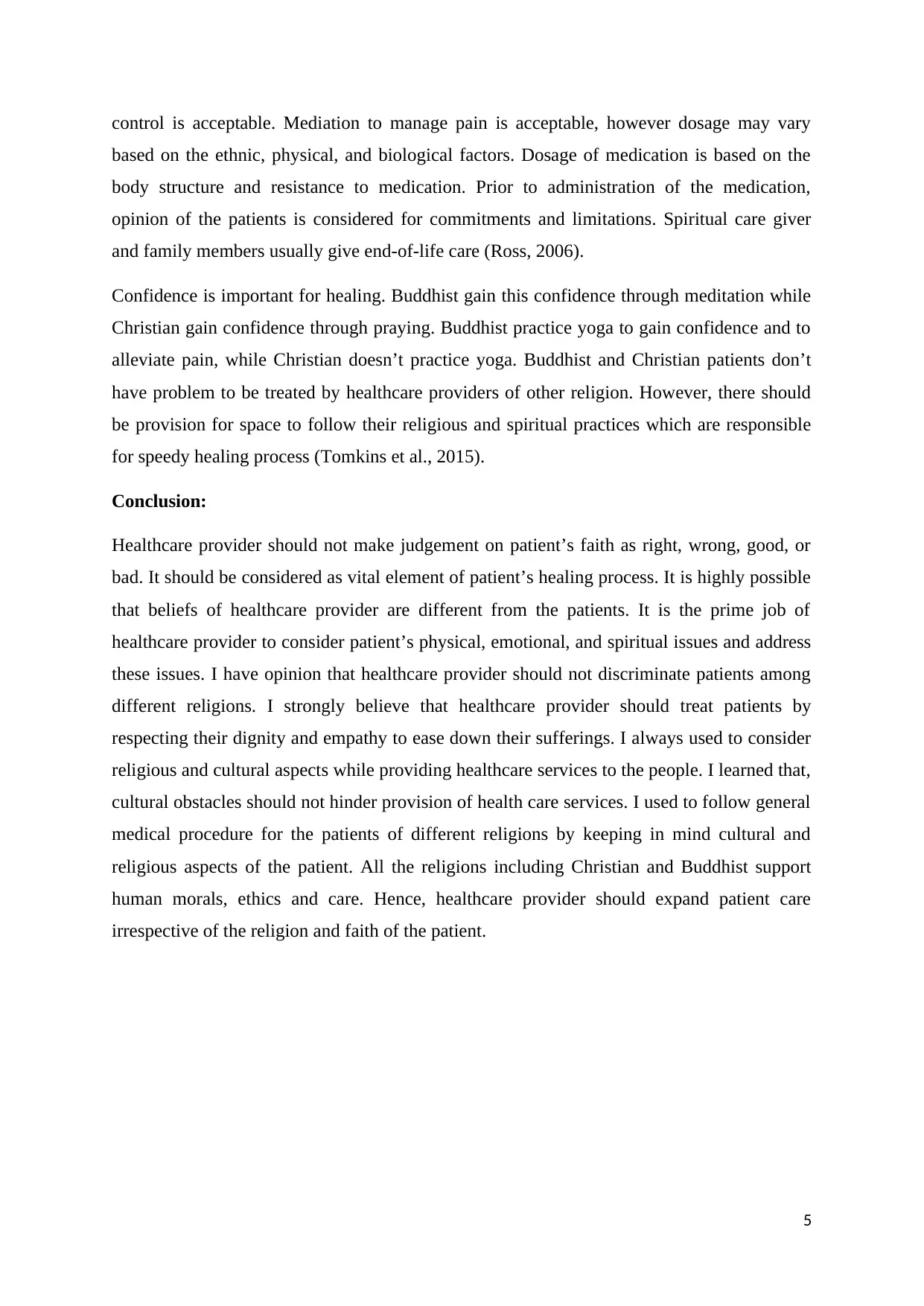
control is acceptable. Mediation to manage pain is acceptable, however dosage may vary
based on the ethnic, physical, and biological factors. Dosage of medication is based on the
body structure and resistance to medication. Prior to administration of the medication,
opinion of the patients is considered for commitments and limitations. Spiritual care giver
and family members usually give end-of-life care (Ross, 2006).
Confidence is important for healing. Buddhist gain this confidence through meditation while
Christian gain confidence through praying. Buddhist practice yoga to gain confidence and to
alleviate pain, while Christian doesn’t practice yoga. Buddhist and Christian patients don’t
have problem to be treated by healthcare providers of other religion. However, there should
be provision for space to follow their religious and spiritual practices which are responsible
for speedy healing process (Tomkins et al., 2015).
Conclusion:
Healthcare provider should not make judgement on patient’s faith as right, wrong, good, or
bad. It should be considered as vital element of patient’s healing process. It is highly possible
that beliefs of healthcare provider are different from the patients. It is the prime job of
healthcare provider to consider patient’s physical, emotional, and spiritual issues and address
these issues. I have opinion that healthcare provider should not discriminate patients among
different religions. I strongly believe that healthcare provider should treat patients by
respecting their dignity and empathy to ease down their sufferings. I always used to consider
religious and cultural aspects while providing healthcare services to the people. I learned that,
cultural obstacles should not hinder provision of health care services. I used to follow general
medical procedure for the patients of different religions by keeping in mind cultural and
religious aspects of the patient. All the religions including Christian and Buddhist support
human morals, ethics and care. Hence, healthcare provider should expand patient care
irrespective of the religion and faith of the patient.
5
based on the ethnic, physical, and biological factors. Dosage of medication is based on the
body structure and resistance to medication. Prior to administration of the medication,
opinion of the patients is considered for commitments and limitations. Spiritual care giver
and family members usually give end-of-life care (Ross, 2006).
Confidence is important for healing. Buddhist gain this confidence through meditation while
Christian gain confidence through praying. Buddhist practice yoga to gain confidence and to
alleviate pain, while Christian doesn’t practice yoga. Buddhist and Christian patients don’t
have problem to be treated by healthcare providers of other religion. However, there should
be provision for space to follow their religious and spiritual practices which are responsible
for speedy healing process (Tomkins et al., 2015).
Conclusion:
Healthcare provider should not make judgement on patient’s faith as right, wrong, good, or
bad. It should be considered as vital element of patient’s healing process. It is highly possible
that beliefs of healthcare provider are different from the patients. It is the prime job of
healthcare provider to consider patient’s physical, emotional, and spiritual issues and address
these issues. I have opinion that healthcare provider should not discriminate patients among
different religions. I strongly believe that healthcare provider should treat patients by
respecting their dignity and empathy to ease down their sufferings. I always used to consider
religious and cultural aspects while providing healthcare services to the people. I learned that,
cultural obstacles should not hinder provision of health care services. I used to follow general
medical procedure for the patients of different religions by keeping in mind cultural and
religious aspects of the patient. All the religions including Christian and Buddhist support
human morals, ethics and care. Hence, healthcare provider should expand patient care
irrespective of the religion and faith of the patient.
5
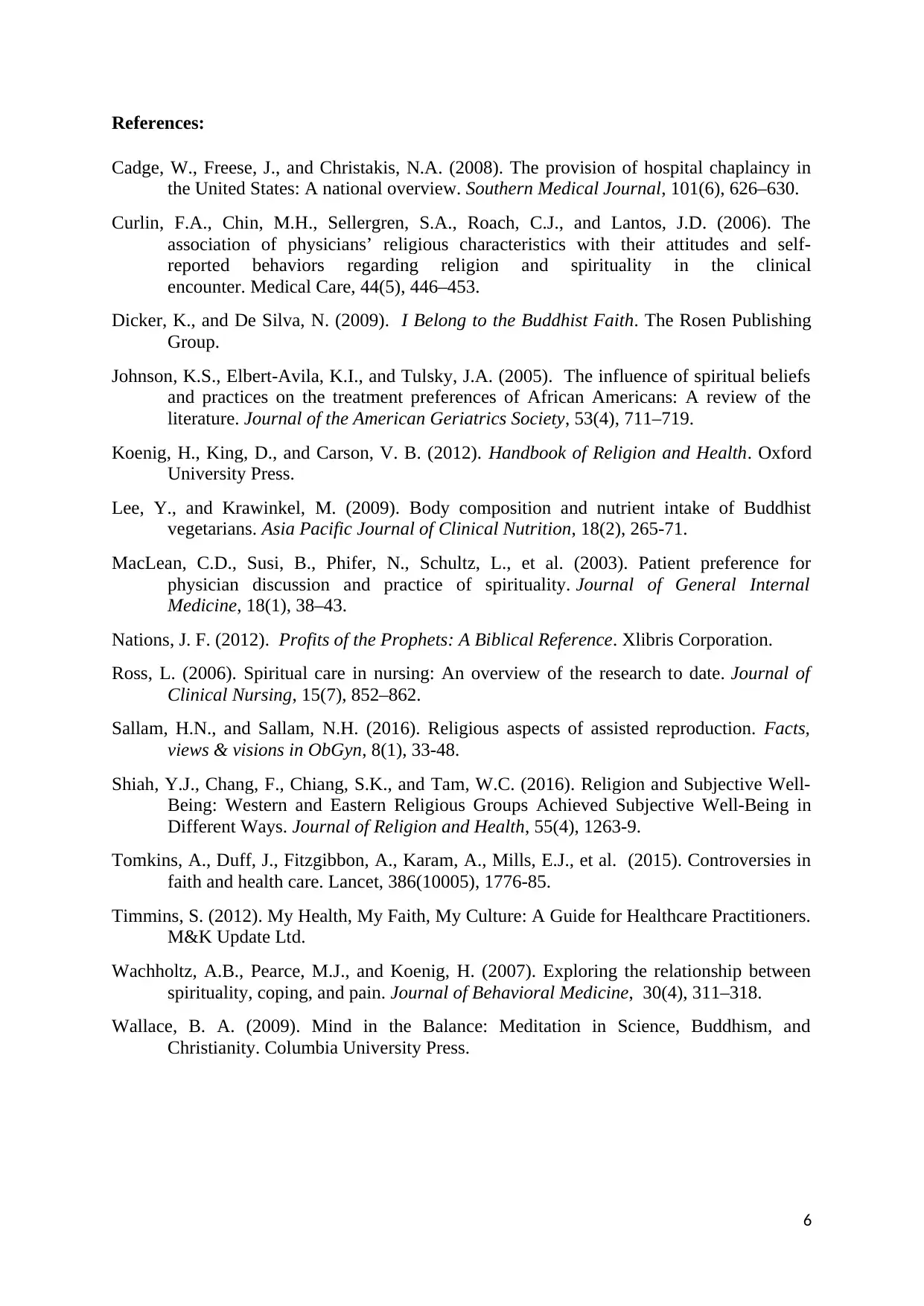
References:
Cadge, W., Freese, J., and Christakis, N.A. (2008). The provision of hospital chaplaincy in
the United States: A national overview. Southern Medical Journal, 101(6), 626–630.
Curlin, F.A., Chin, M.H., Sellergren, S.A., Roach, C.J., and Lantos, J.D. (2006). The
association of physicians’ religious characteristics with their attitudes and self-
reported behaviors regarding religion and spirituality in the clinical
encounter. Medical Care, 44(5), 446–453.
Dicker, K., and De Silva, N. (2009). I Belong to the Buddhist Faith. The Rosen Publishing
Group.
Johnson, K.S., Elbert-Avila, K.I., and Tulsky, J.A. (2005). The influence of spiritual beliefs
and practices on the treatment preferences of African Americans: A review of the
literature. Journal of the American Geriatrics Society, 53(4), 711–719.
Koenig, H., King, D., and Carson, V. B. (2012). Handbook of Religion and Health. Oxford
University Press.
Lee, Y., and Krawinkel, M. (2009). Body composition and nutrient intake of Buddhist
vegetarians. Asia Pacific Journal of Clinical Nutrition, 18(2), 265-71.
MacLean, C.D., Susi, B., Phifer, N., Schultz, L., et al. (2003). Patient preference for
physician discussion and practice of spirituality. Journal of General Internal
Medicine, 18(1), 38–43.
Nations, J. F. (2012). Profits of the Prophets: A Biblical Reference. Xlibris Corporation.
Ross, L. (2006). Spiritual care in nursing: An overview of the research to date. Journal of
Clinical Nursing, 15(7), 852–862.
Sallam, H.N., and Sallam, N.H. (2016). Religious aspects of assisted reproduction. Facts,
views & visions in ObGyn, 8(1), 33-48.
Shiah, Y.J., Chang, F., Chiang, S.K., and Tam, W.C. (2016). Religion and Subjective Well-
Being: Western and Eastern Religious Groups Achieved Subjective Well-Being in
Different Ways. Journal of Religion and Health, 55(4), 1263-9.
Tomkins, A., Duff, J., Fitzgibbon, A., Karam, A., Mills, E.J., et al. (2015). Controversies in
faith and health care. Lancet, 386(10005), 1776-85.
Timmins, S. (2012). My Health, My Faith, My Culture: A Guide for Healthcare Practitioners.
M&K Update Ltd.
Wachholtz, A.B., Pearce, M.J., and Koenig, H. (2007). Exploring the relationship between
spirituality, coping, and pain. Journal of Behavioral Medicine, 30(4), 311–318.
Wallace, B. A. (2009). Mind in the Balance: Meditation in Science, Buddhism, and
Christianity. Columbia University Press.
6
Cadge, W., Freese, J., and Christakis, N.A. (2008). The provision of hospital chaplaincy in
the United States: A national overview. Southern Medical Journal, 101(6), 626–630.
Curlin, F.A., Chin, M.H., Sellergren, S.A., Roach, C.J., and Lantos, J.D. (2006). The
association of physicians’ religious characteristics with their attitudes and self-
reported behaviors regarding religion and spirituality in the clinical
encounter. Medical Care, 44(5), 446–453.
Dicker, K., and De Silva, N. (2009). I Belong to the Buddhist Faith. The Rosen Publishing
Group.
Johnson, K.S., Elbert-Avila, K.I., and Tulsky, J.A. (2005). The influence of spiritual beliefs
and practices on the treatment preferences of African Americans: A review of the
literature. Journal of the American Geriatrics Society, 53(4), 711–719.
Koenig, H., King, D., and Carson, V. B. (2012). Handbook of Religion and Health. Oxford
University Press.
Lee, Y., and Krawinkel, M. (2009). Body composition and nutrient intake of Buddhist
vegetarians. Asia Pacific Journal of Clinical Nutrition, 18(2), 265-71.
MacLean, C.D., Susi, B., Phifer, N., Schultz, L., et al. (2003). Patient preference for
physician discussion and practice of spirituality. Journal of General Internal
Medicine, 18(1), 38–43.
Nations, J. F. (2012). Profits of the Prophets: A Biblical Reference. Xlibris Corporation.
Ross, L. (2006). Spiritual care in nursing: An overview of the research to date. Journal of
Clinical Nursing, 15(7), 852–862.
Sallam, H.N., and Sallam, N.H. (2016). Religious aspects of assisted reproduction. Facts,
views & visions in ObGyn, 8(1), 33-48.
Shiah, Y.J., Chang, F., Chiang, S.K., and Tam, W.C. (2016). Religion and Subjective Well-
Being: Western and Eastern Religious Groups Achieved Subjective Well-Being in
Different Ways. Journal of Religion and Health, 55(4), 1263-9.
Tomkins, A., Duff, J., Fitzgibbon, A., Karam, A., Mills, E.J., et al. (2015). Controversies in
faith and health care. Lancet, 386(10005), 1776-85.
Timmins, S. (2012). My Health, My Faith, My Culture: A Guide for Healthcare Practitioners.
M&K Update Ltd.
Wachholtz, A.B., Pearce, M.J., and Koenig, H. (2007). Exploring the relationship between
spirituality, coping, and pain. Journal of Behavioral Medicine, 30(4), 311–318.
Wallace, B. A. (2009). Mind in the Balance: Meditation in Science, Buddhism, and
Christianity. Columbia University Press.
6
⊘ This is a preview!⊘
Do you want full access?
Subscribe today to unlock all pages.

Trusted by 1+ million students worldwide

7
1 out of 7
Related Documents
Your All-in-One AI-Powered Toolkit for Academic Success.
+13062052269
info@desklib.com
Available 24*7 on WhatsApp / Email
![[object Object]](/_next/static/media/star-bottom.7253800d.svg)
Unlock your academic potential
Copyright © 2020–2026 A2Z Services. All Rights Reserved. Developed and managed by ZUCOL.



